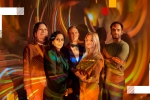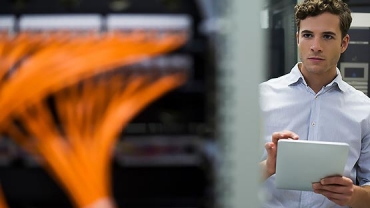
The role of smart data in the energy transition
René Oudejans, CFO of Gasunie says “Digitisation should keep pace with the transition to renewable energy”
The aim is that by 2050 the Netherlands’ energy supply will be carbon neutral and the share of natural gas in the energy mix will have fallen sharply. What does that mean for Gasunie? According to René Oudejans, Gasunie’s CFO, smart data will allow the gas infrastructure company to play a major role in the energy transition. “Our knowledge of energy flows is crucial for a successful transition to renewable energy.”
The Netherlands has ambitious targets for a future based on clean energy: by 2050, the aim is for greenhouse gas emissions to have been significantly reduced and for the energy supply to be virtually carbon neutral. At present, natural gas (43 percent), oil, and coal still account for the vast majority of the energy supply; in 2050 energy will come mainly from renewables such as wind, solar, geothermal heat, and biomass.
“The energy transition has major consequences for the energy supply, current market players, and new players,” says René Oudejans. “In the coming decades, the importance of natural gas in the energy mix will decline in favour of renewable energy sources. For the future, we foresee a combination of sustainable forms of energy that become increasingly interwoven. Natural gas will still be part of that mix, but far less than it is today.”


What role do you think natural gas will play in the future?
“Even in the greenest scenario, gas production in Europe is falling faster than demand in the short term. Over the next ten years, closing that import gap will remain a real challenge for us. And if we look further ahead, then it’s clear that in twenty or thirty years’ time natural gas will no longer be our main source of energy. We’ll be transporting far more renewable gas. But gas can serve as an excellent complement to a sustainable energy supply in peak and backup situations.”
What does the energy transition mean for Gasunie’s existing activities?
“In the long run, we will change from a gas infrastructure company to an energy infrastructure company. Our infrastructure will be increasingly filled with renewable energy sources. Because it basically doesn’t matter whether it’s natural gas molecules or, for example, hydrogen or green gas that needs to be transported. That means that the infrastructure will remain valuable for the energy supply and we therefore have to keep maintaining the network. At the same time, we want to operate more cost-efficiently, for example by digitising processes and with decision-making based on smart data.”
Does the energy transition also offer opportunities to generate new business?
“Besides our position as an infrastructure company, we want to develop into an information structure company. Gasunie’s aim is to use smart data from the gas transport system to help make the energy transition a success. Linked to data from the Royal Netherlands Meteorological Institute (KNMI), for example, that data has a high predictive value. This can be highly relevant to big consumers or the government, for example. The better the market succeeds in integrating networks, energy carriers and systems, the more carbon reduction there will be per euro, and the less supplementary use of fossil energy. That aim is in line with the responsibility that our public task entails, our position as an energy infrastructure company, and our expertise.”

How does that aim express itself in actual practice?
“Gasunie New Energy is a subsidiary that focuses on developing innovative and sustainable energy solutions. We don’t just look at the technology but also at new ways of collaborating and innovative business models. The aim is to join with partners to scale up technology that has proved itself on a small scale into commercial applications. This has led, among other things, to EnergieOpwek.nl, a web tool that shows how much sustainable energy is available in the Netherlands at a given time. Such information can help make the future energy system function as a cleverly integrated whole.”
What are the challenges for Gasunie in terms of digitisation and new business models?
“Major efforts are needed to make the organisation so adaptable that it can respond successfully to the opportunities offered by digitisation. As far as our existing activities are concerned, the organisation has always been on the basis of management by control, so the normal approach hasn’t been to innovate with a fresh perspective or to reconsider existing principles. That’s why we are paying a great deal of attention to celebrating successes, working within flexible organisational structures, and quickly creating a proof of concept in the case of innovation. We are also using sustainable employability initiatives to challenge employees in shrinking units of the company to consider how they can add value to the growth units with their specific qualities.”


Oudejans emphasises that for Gasunie thinking about and implementing digitisation was a process that started “on the inside”. “In view of their social role, utility companies are rather risk-averse. Where digitising our own processes is concerned, we will always remain ‘smart followers’, in the sense that we focus on technology that has already proved itself and which clearly adds value.”
This is different when it comes to supporting the energy transition by developing new business models and forms of cooperation. “Then our responsibility extends much further, because our knowledge of energy flows is crucial for a successful transition to renewable energy. Smart data is needed to develop the transparent and integrated market of the future. That’s why it’s important that our digital efforts keep pace with the energy transition”.
René Oudejans
René Oudejans has been the CFO of Nederlandse Gasunie N.V. since 2012. Gasunie is a partly state-owned gas infrastructure company that transports gas (including green gas) in the Netherlands and northern Germany. It also has two subsidiaries that manage the gas transport network: Gasunie Deutschland in Germany and Nederland Gasunie Transport Services (GTS) in the Netherlands. Gasunie also provides gas storage facilities (EnergyStock), the pipeline to England (BBL), and the LNG terminal Gate in Rotterdam’s “Maasvlakte” port area.
Mr Oudejans started his career at the accountancy firm of Coopers & Lybrand and he then held a number of (corporate) control positions at companies in the telecom sector. He switched to the world of energy in 2003. His positions prior to joining Gasunie included Director Corporate Finance & Control at Essent and CFO of Enexis.
Blockchain
Vertogas is a subsidiary of Gasunie which independently and impartially certifies the production of green gas in the Netherlands. In doing so, Vertogas vouches for the sustainable character and origin of green gas and contributes to the transition to a sustainable energy supply. Its market model was developed in close consultation with market parties and the government.
In the future, the intention is for green gas to be certified using “blockchain”, the same technology that forms the basis for the bitcoin digital currency. This technology allows green gas transactions to be registered and validated in a public online register without the intervention of a third party.
The use of blockchain to certify green gas is still in the experimental phase, says René Oudejans. “It’s a market that’s still relatively small. For Gasunie, the intention is not so much to make a profit from it but rather to increase the share of certified green gas in the energy mix. Our aim is to make Gasunie a party in the energy transition that is requested and valued by partners within the chain.”


















